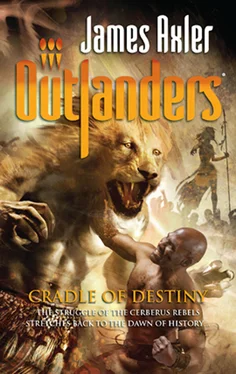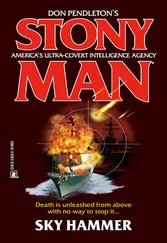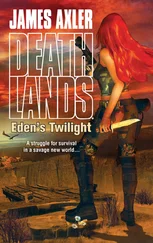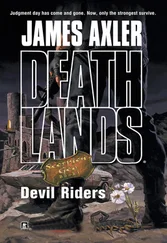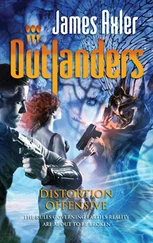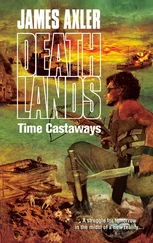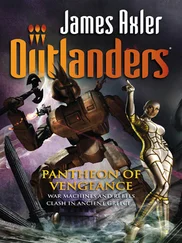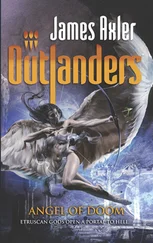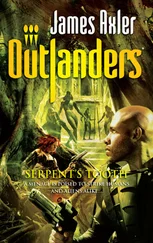“Grant’s brain is fractured,” Kane said.
“More like his consciousness is spread over two levels. Like a shadow cast on an uneven surface,” Brigid told him. “Here, he’s a ghost. Pure ego.”
“And in the past, his body is running around with…what?” Kane asked.
“A good vocabulary, but not much memory, going by our encounters with him,” Brigid explained.
“So Grant’s not operating at his best,” Kane said.
He could read his own face reflected in Brigid’s concerned features.
“We’ll find him. We’ll bring him home and make him whole again,” Brigid told him.
Kane squeezed his eyes shut, then looked down at the darkened pit, where weak, helpless moans rose. He didn’t want to think of what horrors Grant had to face five millennia in the past.

www.mirabooks.co.uk
The present life of men on earth, O king, as compared with the whole length of time which is unknowable to us, seems to me to be like this: as if, when you are sitting at dinner with your chiefs and ministers in wintertime…one of the sparrows from outside flew very quickly through the hall; as if it came in one door and soon went out through another. In that actual time it is indoors it is not touched by the winter’s storm; but yet the tiny period of calm is over in a moment, and having come out of the winter it soon returns to the winter and slips out of your sight. Man’s life appears to be more or less like this; and of what may follow it, or what preceded it, we are absolutely ignorant.
—The Venerable Bede
c. 673–735
The Road to Outlands— From Secret Government Files to the Future
Almost two hundred years after the global holocaust, Kane, a former Magistrate of Cobaltville, often thought the world had been lucky to survive at all after a nuclear device detonated in the Russian embassy in Washington, D.C. The aftermath—forever known as skydark—reshaped continents and turned civilization into ashes.
Nearly depopulated, America became the Deathlands—poisoned by radiation, home to chaos and mutated life forms. Feudal rule reappeared in the form of baronies, while remote outposts clung to a brutish existence.
What eventually helped shape this wasteland were the redoubts, the secret preholocaust military installations with stores of weapons, and the home of gateways, the locational matter-transfer facilities. Some of the redoubts hid clues that had once fed wild theories of government cover-ups and alien visitations.
Rearmed from redoubt stockpiles, the barons consolidated their power and reclaimed technology for the villes. Their power, supported by some invisible authority, extended beyond their fortified walls to what was now called the Outlands. It was here that the rootstock of humanity survived, living with hellzones and chemical storms, hounded by Magistrates.
In the villes, rigid laws were enforced—to atone for the sins of the past and prepare the way for a better future. That was the barons’ public credo and their right-to-rule.
Kane, along with friend and fellow Magistrate Grant, had upheld that claim until a fateful Outlands expedition. A displaced piece of technology…a question to a keeper of the archives…a vague clue about alien masters—and their world shifted radically. Suddenly, Brigid Baptiste, the archivist, faced summary execution, and Grant a quick termination. For Kane there was forgiveness if he pledged his unquestioning allegiance to Baron Cobalt and his unknown masters and abandoned his friends.
But that allegiance would make him support a mysterious and alien power and deny loyalty and friends. Then what else was there?
Kane had been brought up solely to serve the ville. Brigid’s only link with her family was her mother’s red-gold hair, green eyes and supple form. Grant’s clues to his lineage were his ebony skin and powerful physique. But Domi, she of the white hair, was an Outlander pressed into sexual servitude in Cobaltville. She at least knew her roots and was a reminder to the exiles that the outcasts belonged in the human family.
Parents, friends, community—the very rootedness of humanity was denied. With no continuity, there was no forward momentum to the future. And that was the crux—when Kane began to wonder if there was a future.
For Kane, it wouldn’t do. So the only way was out—way, way out.
After their escape, they found shelter at the forgotten Cerberus redoubt headed by Lakesh, a scientist, Cobaltville’s head archivist, and secret opponent of the barons.
With their past turned into a lie, their future threatened, only one thing was left to give meaning to the outcasts. The hunger for freedom, the will to resist the hostile influences. And perhaps, by opposing, end them.
Prologue
Chapter 1
Chapter 2
Chapter 3
Chapter 4
Chapter 5
Chapter 6
Chapter 7
Chapter 8
Chapter 9
Chapter 10
Chapter 11
Chapter 12
Chapter 13
Chapter 14
Chapter 15
Chapter 16
Chapter 17
Chapter 18
Chapter 19
Chapter 20
Chapter 21
Epilogue
Were his face capable of showing more than just the crudest replication of human expression, Ullikummis’s features would have been cast in a brooding, troubled scowl. He had come to Earth in an effort to usurp this fragile blue globe from the talons of Enlil and his brethren, only to find himself dealing with humanity itself. What had most troubled the godling was a face that he had encountered millennia ago, before his banishment.
The one whom he knew by the name of Enkidu, the warrior who had pummeled one of his thralls into unconsciousness, lived in this time as a man called Grant. The last time Ullikummis had seen him was when he was still a child, in the court of his half brother, Humbaba….
As a boy of eight, Ullikummis was already different from his fellow Annunaki. He was larger and stronger than those his age, and the early buds of stone that would form his famous invulnerable hide were mottled discolorations on his scales. As he walked with his mother in his half brother’s court, the beautiful alien rulers of Earth cringed at the sight of him.
Ullikummis knew he was a freak, but his mother told him of the glories that would be bestowed upon him at the hand of Enlil. As it was, the young Annunaki covered his distortions beneath his cloak, glaring from the shadows of a hood at those who knew not the beauty of raw power that had been cooed in his ear by Ninlil, his mother.
“Your half brother, Ullikummis, and his mother, Ninlil,” spoke one of Humbaba’s reptilian Igigi slaves, introducing the pair.
The master of the court of Urudug cast his cold amber eyes to his kin, taking in his height, taller than many of the reptilian slave folk who worked in Humbaba’s court, whose flesh resembled a dried clay tablet, stony with a cracked and pocked surface. Humbaba’s mouth, catlike in nature with a deep cleft, the upper lip dimpled with the bases of several undulating, tentaclelike whiskers underneath a black triangular nose, turned up in a semblance of a smirk, or as close as the feline giant could manage. It was an ironic grin as he recognized his father’s tinkering with the Annunaki perfection.
Humbaba himself was a cast of the die thrown by Enlil. Where the child before him, growing plates of granitelike skin, was obviously an effort at recasting Annunaki genes in a silicon-based life form, Humbaba was combined with one of the races discovered in northern Africa, the Anhur. Conquered by Enlil’s armies, the lion folk had impressed their mutual father enough to warrant experimentation. Though Anhur had been all but scourged from Earth, Enlil had saved a bride from the feline colonists as an experiment to relieve his boredom, curiosity and lust.
Читать дальше
